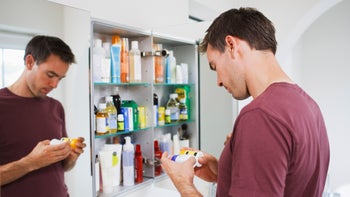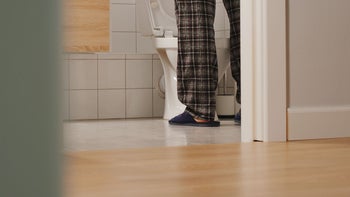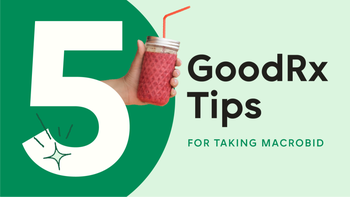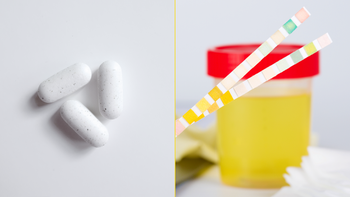
5 Nitrofurantoin Interactions You Should Know About
Key takeaways:
Nitrofurantoin (Macrobid, Macrodantin) is a prescription antibiotic. It's commonly used to treat or prevent urinary tract infections (UTIs). Nitrofurantoin can interact with a few medications, including magnesium trisilicate, probenecid, and the oral cholera vaccine (Vaxchora) and typhoid vaccine (Vivotif).
Nitrofurantoin can also interact with methotrexate. It can also cause a false positive for glucose on a urine test.
Alcohol and nitrofurantoin don’t interact directly. But alcohol can irritate the bladder, worsening UTI symptoms.
Let your healthcare team know what medications you take before you start this antibiotic. They can check for nitrofurantoin interactions.
Access savings on related medications
Table of contents

Urinary tract infections (UTIs) are an all-too-common part of life for many people. Some people get them every now and then, and others get them routinely. They happen when certain bacteria make themselves at home in your urinary tract. If you have a UTI, it’s common to have symptoms like cloudy urine, pain or burning while peeing, and lower abdominal pain.
Nitrofurantoin (Macrobid, Macrodantin) is a first-choice antibiotic for treating and preventing UTIs. Even though it’s beneficial in many ways, it has its risks, such as drug interactions. While nitrofurantoin has fewer interactions than many other antibiotics, knowing what to watch for can help keep you safe. Here, we’ll discuss five nitrofurantoin interactions to know about.
Nitrofurantoin interactions summary
The following medications can interact with nitrofurantoin:
Magnesium trisilicate
Probenecid
Certain live vaccines, such as the oral cholera vaccine (Vaxchora) and oral typhoid vaccine (Vivotif)
Methotrexate
Search and compare options
Nitrofurantoin can also cause a false positive for the presence of glucose on urine tests.
This isn’t a complete list of nitrofurantoin interactions. So be sure to give your healthcare team a list of your current medications before starting nitrofurantoin. This will help them check for possible drug interactions.
1. Magnesium-containing antacids
An old study of six adults showed that magnesium trisilicate reduced the absorption of nitrofurantoin. This likely happens because magnesium trisilicate sticks to nitrofurantoin in your gut, making it harder for nitrofurantoin to do its job. If this happens, you may not get your full dose of nitrofurantoin, which can lead to an undertreated UTI.
Magnesium trisilicate used to be a common ingredient in antacids, a go-to treatment for heartburn. But current antacid formulations no longer contain this type of magnesium. Still, if you take antacids, check if they contain magnesium trisilicate. While you’re taking nitrofurantoin, it’s best to avoid this ingredient.
Other forms of magnesium may affect nitrofurantoin absorption, but probably not as much. Still, you may also want to avoid all magnesium-containing antacids — and magnesium supplements — as a precaution. Over-the-counter (OTC) antacids with magnesium include:
Gaviscon Extra Strength (aluminum hydroxide / magnesium carbonate
Mylanta (aluminum hydroxide / magnesium hydroxide / simethicone)
Milk of magnesia (magnesium hydroxide)
Ask your healthcare professional what they recommend for heartburn besides magnesium-containing antacids. They may recommend other antacids, such as Tums (calcium carbonate). Or they may recommend histamine-2 antagonists, such as famotidine (Pepcid AC).
2. Probenecid
Probenecid is a medication that treats gout. It can also boost the effects of certain antibiotics, making them more effective.
However, this isn’t true for nitrofurantoin. Probenecid can elevate nitrofurantoin levels in your blood and decrease levels in your urinary tract. High levels of nitrofurantoin in your blood raise your risk of side effects, such as nausea and headache. And low levels of nitrofurantoin in the urinary tract make it less effective at treating UTIs.
Nitrofurantoin side effects: Learn about common and rare nitrofurantoin side effects to watch for while taking this antibiotic.
UTI antibiotics: Wondering about other antibiotics for UTIs? Discover your options.
Cipro vs Macrobid: These two common UTI medications have several differences. Learn how they stack up.
If you’re taking probenecid, let your prescriber know before starting nitrofurantoin. They may recommend another antibiotic for your UTI.
3. Certain live vaccines
Nitrofurantoin and live vaccines have the same goal — keeping your body free from infection. But even though they’re used for similar reasons, they don’t always mesh well. If you take nitrofurantoin with certain live vaccines, the vaccines may be less effective. This mostly applies to travel vaccines.
If you have an international trip planned, it’s important to think ahead as much as possible. According to the CDC, if you just finished your nitrofurantoin prescription, you should wait 14 days (2 weeks) before taking the oral cholera vaccine (Vaxchora). If you’re planning on taking the oral typhoid vaccine (Vivotif), try to wait 72 hours (3 days) after finishing your nitrofurantoin prescription. Ask your healthcare professional for instructions on what to do if you’re taking nitrofurantoin for UTI prevention.
Keep in mind that other routine vaccines, such as COVID-19 vaccines and the flu shot, aren’t affected by nitrofurantoin.
4. Methotrexate
Methotrexate is a medication that treats a variety of health conditions, including rheumatoid arthritis, cancer, and more.
However, methotrexate can cause a number of side effects, including potentially serious toxicity if your dose is too high. Toxicity can lead to several health issues, including lung damage. In rare cases, nitrofurantoin can also cause severe lung problems. So lung problems may be more likely to happen if you take nitrofurantoin and methotrexate together.
Based on your medical history, your healthcare professional can let you know if taking nitrofurantoin and methotrexate at the same time is safe.
5. Certain lab tests
Interactions between medications aren’t the only type of interaction that can occur. Nitrofurantoin may also affect some urine laboratory tests.
Your urine may be tested in a lab or health clinic for a variety of health reasons. A urinalysis looks for abnormalities in your urine, such as changes in its composition or appearance. For example, glucose isn’t typically in your urine. If it is, it’s a possible sign of a health condition.
However, nitrofurantoin can cause a false positive for glucose in the urine. That is, it can appear as if glucose is in your urine when it really isn’t. So if you’re taking nitrofurantoin and a healthcare professional orders a urine test, make sure they know that you’re currently taking this antibiotic. They may recommend waiting to do your urine test until you're done with your prescription
Are there foods to avoid while taking nitrofurantoin?
With some medications, you may need to avoid certain foods due to drug-food interactions. Fortunately, foods aren’t known to interact with nitrofurantoin.
However, certain foods and drinks may aggravate your bladder and worsen your UTI symptoms. While research on this is limited, some foods and drinks to discuss with a healthcare professional include:
Large amounts of coffee or other sources of caffeine
Acidic drinks, such as orange and grapefruit juice
Acidic foods, such as tomatoes and oranges
Spicy foods
Keep in mind that it’s recommended to take nitrofurantoin with a meal or snack. This reduces your chances of developing an upset stomach. It can also help nitrofurantoin work better because food helps it be more fully absorbed. Since nitrofurantoin is taken twice a day, try taking it with breakfast and dinner.
Can you drink alcohol while taking nitrofurantoin?
There aren’t any direct interactions between alcohol and nitrofurantoin. But it’s best to avoid drinking alcohol while you’re sick. This is because drinking alcohol makes it harder for your body to get well. This is especially true if you drink heavily.
What’s more, alcohol can irritate your bladder, and may worsen UTI symptoms.
Frequently asked questions
Medications that treat allergy symptoms aren’t known to interact with nitrofurantoin. Examples include loratadine (Claritin), cetirizine (Zyrtec), and diphenhydramine (Benadryl). Other medications that may relieve allergy symptoms, such as Flonase Allergy Relief (fluticasone) and Sudafed (pseudoephedrine), are also safe to take with nitrofurantoin.
If you have a UTI, you may be inclined to reach for an OTC pain medication like Tylenol (acetaminophen). You may also consider nonsteroidal anti-inflammatory drugs (NSAIDs) such as ibuprofen (Motrin, Advil). Phenazopyridine may also be an option.
These medications aren’t known to interact with nitrofurantoin, so they may be safe for you to take. But check with your healthcare professional about which option is best for you. If you have other health conditions and take medications, one OTC pain reliever may be safer for you than another.
The bottom line
Nitrofurantoin (Macrobid, Macrodantin) is an antibiotic that prevents and treats urinary tract infections (UTIs). It may interact with other medications or supplements. Possible nitrofurantoin interactions are with magnesium trisilicate, probenecid, and the oral cholera vaccine (Vaxchora) and typhoid vaccine (Vivotif). Additionally, nitrofurantoin can also interact with methotrexate. Nitrofurantoin can also cause a false positive for glucose on a urine test.
Be sure to give your healthcare team a list of your current medications before starting nitrofurantoin. This will help them check for possible drug interactions.
Why trust our experts?



References
Amneal Pharmaceuticals LLC. (2024). Nitrofurantoin (monohydrate/macrocrystals)- nitrofurantoin monohydrate/macrocrystals capsule [package insert].
Kochhar, S., et al. (2022). A unique interaction of methotrexate and nitrofurantoin resulting in irreversible pulmonary fibrosis. Cureus.
Naggar, V. F., et al. (1979). Effect of magnesium trisilicate on nitrofurantoin absorption. Clinical Pharmacology and Therapeutics.
National Institute of Diabetes and Digestive and Kidney Diseases. (2024). Eating, diet and nutrition for interstitial cystitis.
Sarkar, D., et al. (2015). Alcohol and the immune system. Alcohol Research.
Youngster, I., et al. (2024). Interactions between travel vaccines and drugs. Centers for Disease Control and Prevention.
Was this page helpful?
Related Articles
Browse medications
View AllResearch prescriptions and over-the-counter medications from A to Z, compare drug prices, and start saving.






















